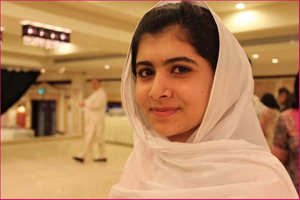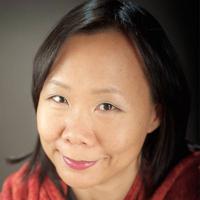
During supper one October evening while listening to the news on the radio, I suddenly put down my fork and gripped my 10-year-old son's arm. We listened intently to the broadcast. A Taliban gunman had shot 14-year-old Malala Yousafzai in the head while she was sitting with her classmates on a bus in Mingora, Pakistan. The Guardian reported that a Taliban spokesman characterized Malala's advocacy work for girls' education as an "obscenity" that had to be stopped. Malala and her family had been targeted because of the blog she had written for the BBC while she was in seventh grade chronicling the effects of Taliban repression in her region, including the burning of girls' schools.
"Why did they shoot her?" my son asked me, aghast. I attempted to explain the attitudes of religious extremists, their desire to maintain social, political and economic control and power by excluding women from education, employment, and equal participation in a community. I reminded him that many cultures throughout time believed women to be inferior to men, just as they believed that certain groups of people were inferior because of their race or nationality. But to him, discrimination and violence against women seem irrational and bizarre. In his mind, women and men -- girls and boys -- have always been equals.
Like many parents, I've often struggled to formulate a simple, straightforward and age-appropriate answer to respond to my child's questions. It's impossible to distill the history, politics, sociology, religion, philosophy, economics or psychology behind any particular news story into a one-liner or even a hundred-liner. I don't always have the answers myself -- only more questions.
The scope and scale of discrimination and violence against women around the world today boggles the mind, ranging from reports about the widespread use of rape as a weapon of war in the Democratic Republic of Congo where hundreds of thousands of women have been brutally raped by rebel and government militias since 1998, to the sexual assaults in Tahrir Square of female protestors by government soldiers.
Canada is by no means exempt. Locally, the Missing Women's Inquiry into the seriously flawed police investigation of the missing and murdered women of the Downtown Eastside exposed institutionalized discrimination against some of the most marginalized women in our society. The Inquiry Commisioner's report will be made public this month. (Three groups, Pivot Legal Society, Westcoast LEAF and the BC Civil Liberties Association have already released a joint report criticizing the inquiry process.)
This month also marks the anniversary of the deaths of 14 women engineering students at a classroom Montreal's École Polytechnique in 1989. The gunman, who had a grudge against feminists, ordered the male students to leave before shooting the women who remained. He then went on a rampage through the school, injuring 10 additional women and four men.
After the horrific targeted killing, the federal government declared Dec. 6 the National Day of Remembrance and Action on Violence Against Women. The wording is significant: it goes beyond what happened 23 years ago to include violence that has occurred in the past and still occurs in the present here and elsewhere, and emphasizes the need for all of us to take steps to prevent and eradicate it.
Taking action
Positive steps continue to be taken locally, nationally and internationally on the issue of violence against women.
Every October, YWCAs across Canada mark a national week of violence prevention from October 15 to 21, the Week Without Violence. YWCA Metro Vancouver has developed a protocol, "Signs of Violence" to assist the public in recognizing the early signs of abuse, such as harassing text messages, controlling behaviour and forced isolation. It runs programs and services to help women fleeing abuse, including transition houses, counselling and workshops for children who witness abuse, and a violence outreach and support program for women who experience violence in their relationships.
Lisa Rupert, the associate director of housing with YWCA Metro Vancouver, told me in an email interview how necessary it is for all of society to work together to end violence against women: "Focusing on women's recognition of and response to abuse in intimate relationships doesn't address the abuse itself. Men have an important role to play as allies to women in societal change as it may be easier for men and boys to hear the message from other men... Changing societal values is obviously not going to happen overnight, but is a long term goal."
Related to the movement to change attitudes is developing an effective legal system that can take prompt and appropriate action in cases of violence against women. The Jane Doe project, consisting of representatives of key local anti-violence organizations, have collaborated on a report, "Imagining Courts that Work for Women Survivors of Violence," that was launched on Nov. 27. It analyzes B.C.'s justice system's response to violence against women, provides an overview of other programs in other jurisdictions, and makes recommendations about reform and the establishment of specialized courts.
Internationally, V-Day, an organization founded by U.S. playwright, Eve Ensler, has worked with UNICEF and the Panzi Foundation to establish The City of Joy, a centre to assist survivors of rape in Bukavu in the Democratic of Congo. In an interview last year with The Guardian, Ensler commented that "Rape, devastating everywhere, particularly undermines Congolese society. After being raped a woman is usually excluded by her family and so, when women have the babies and do all the cooking, farming, carrying, community is quickly undermined. Society breaks down... If you destroy women, you destroy the Congo. Raping women is the cheapest and most effective way to instil fear in and humiliate a community. It doesn't even cost a bullet."
The City of Joy addresses that exclusion through its grassroots owned, run and led program that provides safe shelter and training to assist rape victims in reintegrating with their communities. During a six month residential program, women receive training in horticulture, accounting, self-defence, literacy, computers, and other areas. There have been two graduating classes since its opening. The Stephen Lewis Foundation has been involved in supporting the program through Eve Ensler's V-Day. SLF's director of operations, Margaret Wright, stated in an email interview with the me that "[the organizers] recognize that follow up is incredibly important and have been able to ensure that the women are doing well when they have gone back into the community."
Since that alarming news report about Malala back in October, the government of Pakistan has assisted Malala in obtaining medical treatment in England, and has introduced legislation of a $500 fine on those seeking to keep children from attending school.
Thousands of people from all over the world have signed a petition started by Canadian news columnist, Tarek Fatah, that urges the Nobel Prize Committee to award the 2013 Nobel Peace Prize to Malala Yousafzai, the young activist for girls education. All four of our country's federal leaders have independently signed the petition -- a truly extraordinary act of unity.
On this day of remembrance and action, let us hope that a spirit of unity and cooperation leads to continued progress both here and abroad in making freedom from violence a reality for women and girls across all sectors of society.
In commemoration
Here's a prose poem about the events of Dec. 6, 1989 written by Victoria poet, Arleen Paré, originally from Montreal. In an email interview, Pare remarked that she had wanted "to convey the idea that this is a state that many women live with -- the worry that they are not safe... that women are killed for being women."
Copyright © 2010 by Arlene Paré. Reprinted from an anthology of prose and poetry on the theme of violence against women, Walk Myself Home: An Anthology to End Violence Against Women with the permission of the author and Caitlin Press. ![]()
Read more: Rights + Justice, Gender + Sexuality















Tyee Commenting Guidelines
Comments that violate guidelines risk being deleted, and violations may result in a temporary or permanent user ban. Maintain the spirit of good conversation to stay in the discussion.
*Please note The Tyee is not a forum for spreading misinformation about COVID-19, denying its existence or minimizing its risk to public health.
Do:
Do not: